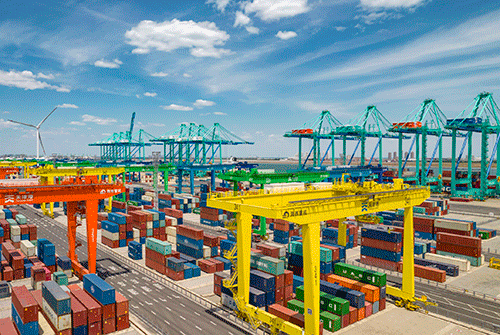Tianjin Port Group and Huawei this week announced that the two companies will deepen cooperation to build a digital twin of the port, making it more automated and intelligent.
Yang Jiemin, vice president of Tianjin Port Group, explained this plan consists of three parts: construction of new automated terminals, upgrading of traditional terminals and comprehensive digital transformation.
The Section C Terminal in the Beijing Port Area of the Port of Tianjin was the world’s first smart, zero-carbon port terminal.
It entered large-scale commercial operations in October 2021, and it has been stably operating ever since.
5G and L4 autonomous driving technologies are applied at this terminal to make it safer and more efficient.
At the terminal, container cranes operate automatically and intelligent robots of the horizontal transportation system frequently come and go.
Remotely controlled quay cranes lift loaded containers from cargo ships and put them onto intelligent robots for horizontal transportation.
Supported by the BeiDou Navigation Satellite System, these robots are guided to automatic locking/unlocking stations to unlock containers and then to the container yard along optimal driving routes that are calculated in real-time.
The entire process runs smoothly.
Yang explained how the new solution, which combines 5G and L4 autonomous driving technologies, has for the first time been put into large-scale commercial application in a partially public scenario at the Section C Terminal.
This has provided a new model for upgrading and transforming existing traditional container terminals worldwide.
“These innovations being used at the Port of Tianjin are having a huge impact on the port industry, creating new value for ports by improving operating environments, driving green and low-carbon development and increasing operational efficiency. We believe that these practices will promote the intelligent development of the global port industry,” said Yang.
Yue Kun, chief technology officer of Huawei’s Smart Road, Waterway & Port BU, stated, “Ports are a vital link in maritime transportation, connecting trade and supply markets across the globe. Building more efficient smart ports is becoming an increasingly pressing requirement for the global supply chain. Section C Terminal of the Port of Tianjin has now been operating stably for over one year. This proves that 5G and L4 autonomous driving have already been successfully adopted by industries in China, and they are creating true commercial and social value”.
Yue believes this progress will benefit various industries, with next-generation digital technologies, such as 5G and AI, combined to solve industry problems, promote digital industry transformation as well as upgrade and generate social value.



